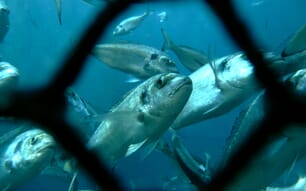The fishery, which includes 30 fishing companies and landed 71 million metric tonnes of pollack last year, is one of the largest suppliers of pollock from the North Pacific, serving over 20 countries across five continents. This fishery uses mid-water trawls, which are more selective and usually less destructive than bottom trawls, as they aren't in constant contact with the sea floor.
Every five years MSC-certified fisheries have to go through the full assessment process again to ensure they are continuing to meet the MSC Fisheries Standard. The PCA first obtained MSC certification in 2013, but the fishery was given eight conditions to address over the following five years in order to be recertified, all of which were closed. Three conditions were aimed at improving the scientific basis of stock assessment and fishery management and were met successfully. Another three conditions concentrated on minimizing the fishery's impact on the Sea of Okhotsk ecosystem, including fishing operations' interaction with endangered, threatened and protected (ETP) species. Two further conditions were set for the management process. Closure of these conditions has led to greater transparency and closer involvement of stakeholders, including environmental NGOs.
Camiel Derichs, Director MSC Europe, said: “Congratulations to the Pollock Catchers Association (PCA) on their recertification. Over the past five years, the PCA, scientists, management and NGO actors in Russia have worked hard to address the conditions placed on the fishery, resulting in real improvements. The progress achieved was recognised in the re-assessment, where the PCA received higher scores than previously for many assessment indicators.”
“As the only global wild capture fisheries standard meeting the ISEAL codes of good practice, the MSC reviews its standards every five years in light of progressing science and management best practice. As a result of the last Fisheries Standard Review (FSR), the MSC has adopted a new standard (version 2.0). Over the course of their new certification time frame, we hope the PCA will continue to make improvements to ensure a smooth transition to this new version of the MSC Standard,” he continued.
"WWF Russia started cooperation with the Pollock Catchers Association before their first certification was issued. WWF was one of the organisations that raised objections to this fishery. At present, we are satisfied with the progress observed during the five-year period since the first certificate was issued. The Association has already taken into account a number of comments made by WWF during annual audits. To study and minimize the bycatch of seabirds and marine mammals, PCA management together with scientists from the TINRO-center conducted works on vessels,” said Andrey Vinnikov from WWF Russia.



